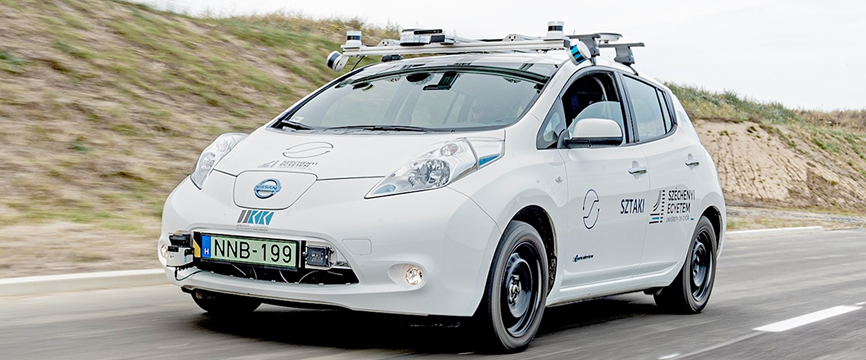
Basic data

Field of Operation
Place of implementation
Description
The National Lab for Autonomous Systems aims to coordinate mobility-related research, development and innovation solutions for road and air vehicles and robots, with a focus on complex systems, formations and applications requiring autonomous and cooperative operation. The aims of the laboratory include high-level research and development, training of young scientists, and the promotion of successful national and international collaborations. Accordingly, the target groups will be students and young researchers in higher education, for whom the Lab offers relevant and modern knowledge, exciting research topics and, as a consequence, a career in research. In addition, the automotive industry, national and international research institutions and professional organisations also form an important target group.Main research areas:
-
Autonomous road and air vehicles
-
Autonomous robotics and manufacturing systems
-
Management planning strategies
-
Vehicle dynamics and control
-
Cooperative management
-
Robotics modelling and control
-
Mobile robotisation
-
Applied research infrastructure
-
Infocommunications
-
Systems integration research
-
Electromobility
-
Digital twin, mathematical modeling, simulation
Benefits to be expected from laboratory research:
- Address research and development challenges related to mobility provided by road and air vehicles and mobile robots; demonstrate the functional and cooperative operation of such systems; and coordinate the necessary research, development and innovation activities.
- Address research challenges in an efficient and innovative way through coordinated cooperation between the national professional and research community on mobility.
- Create an effective professional network, which will provide a platform for R&D activities in the field of autonomous systems, and will also provide an opportunity for knowledge transfer between ARNL participants and other universities, research institutes, industry, and SMEs.
- Accelerate development work on general and dedicated cyber-physical manufacturing and logistics systems.
- Increase the social acceptance of autonomous vehicles by better communicating the related R&D results in a more coordinated way, better reflecting the collaboration between industry and research, better highlighting the societal benefits of the results and in a way that is understandable to the general public.
- Further purpose of the project is to strengthen the environmental exploitation of autonomous vehicles and mobile robotics.
- Support research institutes and industrial actors, SMEs and educational institutions linked to the ARNL professional network in their efforts to become an integral part of the Hungarian innovation ecosystem in the field of autonomous systems research, development and related innovation, and thus to increase the competitiveness of the country.
- Support the educational and technical institutions of higher education, both within and outside the Consortium, in their efforts to modernise and update their BSc, MSc and PhD programmes, their training courses and their trainee programmes for university students in the field of autonomous systems.
- Thoughtfully disseminate knowledge needed to conduct research in the field and to effectively implement related developments, through innovative knowledge transfer mechanisms and traditional higher education channels.
Consortium leader
HUN-REN Institute for Computer Science and Control
Consortium partners
- Budapest University of Technology and Economics
- Széchenyi István University
Utolsó módosítás: 18 June 2024
Related news
News and Press

News
A hazai kutatók nemzetközi beágyazottságát, kutatás-fejlesztési együttműködéseit nagymértékben elősegíti aktív kapcsolatuk a világ legjelentősebb kutatási infrastruktúráival (KI) és bekapcsolódásuk az ott folyó élvonalbeli kutatásokba. A legkorszerűbb KI-k olyan nagy költségű berendezések, létesítmények vagy adatbankok, amelyek építése, fejlesztése és működtetése meghaladja egy-egy ország gazdasági teljesítőképességét, így nemzetközi együttműködésben valósulnak meg.
18 02 2022

News
Budapest, Saturday, 9 April 2022 (MTI) - According to recent government decisions, a total of ten billion forints will be used in world-class research and development projects and the Cooperative Doctoral Programme, the Ministry for Innovation and Technology (ITM) told MTI on Saturday.
09 04 2022

News
Vice President Katalin Sebők spoke about the functioning, benefits and role of Regional Innovation Platforms in building the innovation ecosystem at the event showcasing university technologies.
28 03 2022




 ENG
ENG

 Back
Back




